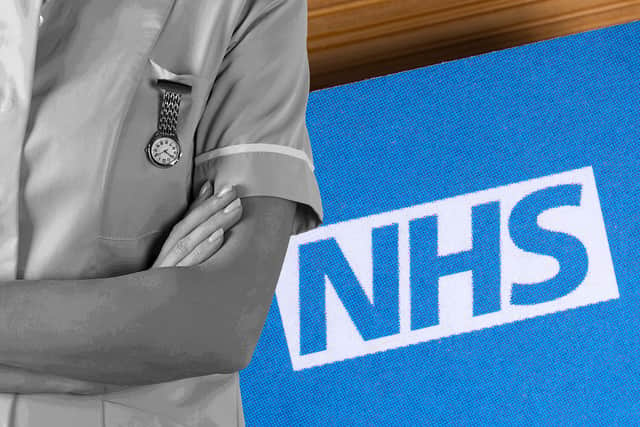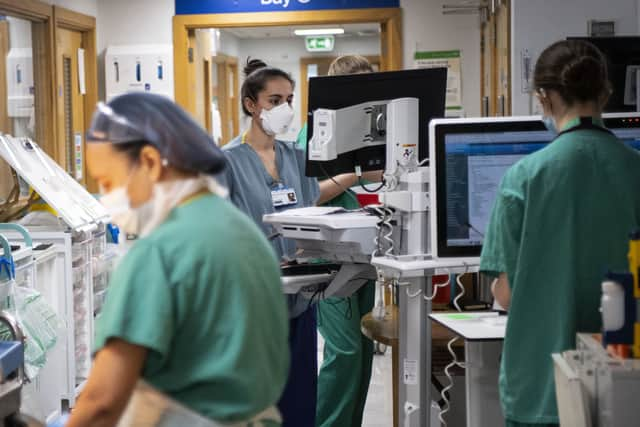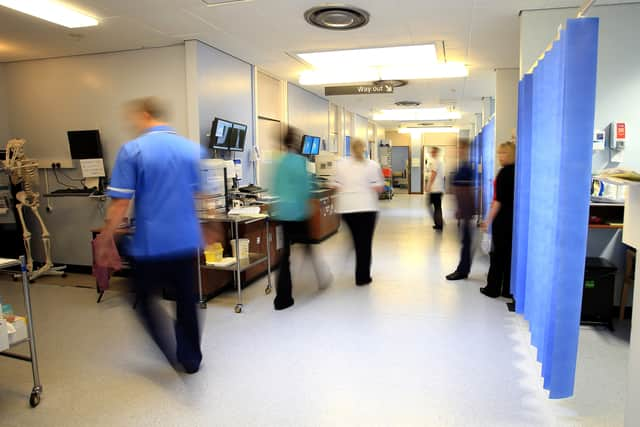NHS staff shortages: healthcare bosses paying agencies up to £2,500 to cover nurse and doctor shifts
and live on Freeview channel 276
A lack of doctors and nurses has forced NHS bosses to pay agencies up to £2,500 per shift in order to fill gaps in rotas.
Figures from the BBC have shown that spending on agency staff rose by 20% last year to hit £3 billion in England, while separate data supplied by the Labour Party has revealed that some NHS trusts have paid doctors and nurses as much as £2,500 to cover shifts. This breaches government pay gaps, which is something bosses can only do if there is a significant risk to patient safety.
Advertisement
Hide AdAdvertisement
Hide AdOut of 60 responses from various NHS trusts, 10 reported the most expensive shift cover cost over £2,000, while another 13 said it was between £1,000 and £2,000. Previously reported figures suggest agency spending also appears to be rising in other parts of the UK: in Scotland it has doubled in the past year, in Wales it has risen by more than 40%, and in Northern Ireland, it is four times higher than it was three years ago.
Saffron Cordery, interim chief executive of NHS Providers, which represents trusts in England, said: “Leaders consistently raise concerns about sky-high agency costs. They’re already facing enormous financial pressures with the impact of inflation and energy costs, and the government’s failure to fully fund staff pay awards. They are doing all they can to minimise agency spend. But safety must always come first.”
Currently, one in 10 NHS positions is vacant - with approximately 47,000 nursing vacancies. The government has said it is working on a plan that ensures the NHS has the staff it needs in the future, and that it expects agency spending to have reduced by at least 10% this year.
Those in the medical field have said the astonishing pay offers are representative of the severe shortage of nurses and doctors that the UK is currently seeing, and are clear evidence of how much supply issues can cost the NHS.
Advertisement
Hide AdAdvertisement
Hide AdDr Sarah Clarke, a cardiologist and president of the Royal College of Physicians, told GB News: “Staff shortages have meant that we’ve had to dip into the public spending and pay for agency and locum staff and this of course comes at a significant cost.” She said some staff want to work as locums as it pays more, gives more flexibility and “takes them away from some of the terms and conditions that are unpopular”.
Dr Clarke said that a fix for the issue would be to employ more doctors, explaining that doubling the number of medical students to 15,000 would cost £1.8 billion per year – which would be cheaper than the current cost of agency staff.


Explaining how these rates mean that agency staff can make more money than regular NHS doctors and nurses, she said: “Unfortunately, they are employed by agencies so the agency sets the fees. If we are short-staffed, we have to go and get more staff because this is about patient safety. We have to have people there to care for our patients.”
Agency pay rates are capped at 55% above what a normal employee would receive, but the investigation by the BBC discovered that bosses do not always stick to this. Figures show that the caps were exceeded in the past year for nearly nine in 10 agency doctors, four in 10 agency nurses, and nine in 10 agency dentists. The rise in 2021-22 comes after many thought the NHS had got a hold of the use of agency work following a government crackdown in 2015-16 when the cap was introduced.


Advertisement
Hide AdAdvertisement
Hide AdMinisters set the NHS the task of moving away from agency work and encouraged the use of NHS staff banks, where employees do overtime. But many staff are now gravitating back towards agency work, with Dr James Barson, a cancer doctor based in Lincolnshire, telling the BBC that the pull factors included higher pay and not needing to work nights or weekends.
Nick Hulme, chief executive at East Suffolk and North Essex NHS Trust, said he had even seen some people leave their jobs only to return to the same hospital as agency workers. He added that while agency workers do great work on the wards, he would prefer to be able to use his own staff.
“We know that’s best for patient care, best for patient experience,” he commented, explaining that “agency staff require more supervision and tasks such as handovers take longer.” He acknowledged to the BBC that hiring workers from agencies is not the best use of taxpayer money, but said “quality and safety of care is always going to be the priority.”
In addition to staffing shortages, Mr Hulme said that the need to open extra wards to cope with rising demand is also contributing to the need to use agencies.
Advertisement
Hide AdAdvertisement
Hide AdLabour’s Shadow Health Secretary Wes Streeting said: “Taxpayers are picking up the bill for the Conservatives’ failure to train enough doctors and nurses over the past 12 years. This is infuriating amounts of money paid to agencies, when patients are waiting longer than ever for treatment.
“Labour will tackle this problem at its root. We will train the doctors and nurses the NHS needs, paid for by abolishing the non-dom tax status. Our NHS needs doctors and nurses more than the wealthiest need a tax break.”


A spokesperson for the government’s Department of Health and Social Care said the past year had seen some exceptional workforce pressures, and a drive to get services back to normal following the pandemic. But she said the expectation was that spending would be reduced by at least 10% this year.
She commented: “We have a clear policy to reduce agency spend through capping the hourly pay of agency and temporary staff, ensuring they are only hired through approved NHS agreements to ensure value for money - prioritising NHS staff.”
Comment Guidelines
National World encourages reader discussion on our stories. User feedback, insights and back-and-forth exchanges add a rich layer of context to reporting. Please review our Community Guidelines before commenting.
